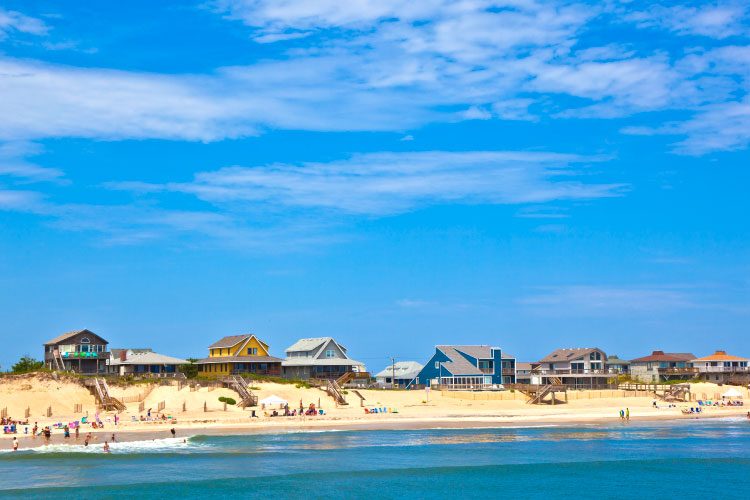
Retiring in North Carolina: From the Blue Ridge to the Beaches, 6 Spots To Spend Your Golden Years
Retirement North Carolina
One of the biggest draws of North Carolina is the magnificent natural beauty — from mountain views to more than 300 miles of coastline. And from the vibrant city streets to the peaceful communities, there’s truly a place for every lifestyle when retiring to North Carolina.
|
Planning a move to North Carolina? Start by getting a free quote from PODS. |
Benefits of Retiring in North Carolina
If you’re a new retiree looking for a relocation and lifestyle change, low taxes on retirement income may be near the top of your list of must-haves. You’re in luck if you pick the Tar Heel State: All social security retirement benefits are exempt from income taxes — and as a bonus, you don’t have to pay estate taxes, either.
You can also basically take your pick when it comes to weather preferences in North Carolina. Like warmer temps year-round with calm and mild winters? The coast is the place for you. Love bundling up in the cold and enjoying mountain views? In that case, the West might be best. So, if you’re a retiree, what is it like to live in North Carolina? Keep reading.
Retiring in North Carolina — FAQs
Q: Is North Carolina a good state to retire in?
A: With lower tax rates on retirement income than other states and a cost of living lower than the national average, North Carolina is a fantastic state for retirees!
Q: Is North Carolina or Florida better for retirees?
A: That depends on your personal preferences, of course, but by retiring in North Carolina rather than Florida, you’re opting for a cheaper lifestyle. You’ll also get to experience the changing seasons and a different type of environment altogether. And if you want to access mountains and snow during the winter without a very long drive, North Carolina is a far better option than Florida.
Q: Is North Carolina tax-friendly for retirees?
A: Social security on your federal tax return is exempt from the state’s income tax. But North Carolina retirees pay state taxes on withdrawals from retirement accounts, along with pension incomes.
Q: Is it cheaper to retire in NC or SC?
A: While both NC and SC offer many of the same amenities and tax perks, it’s slightly cheaper to retire in SC, as it has a lower cost of living.
Q: Where in North Carolina is the best place to retire?
A: Are you a beach lover or the mountain-climbing type? Enjoy quiet nights on a starlit porch — or prefer dancing ‘til dawn at a hip downtown club? Those are the questions you need to ask as you’re considering retiring in North Carolina. And Greensboro may be your answer, with the best of both worlds at your doorstep — or at least within a day’s drive.

Gorgeous mountain scenery, including Looking Glass Falls in Brevard, is a wonderful perk of retiring in North Carolina.
Retiring in North Carolina Pros and Cons
Along with an eclectic mix of retirement communities, the benefits of choosing the Tar Heel State are plentiful. But while the positives certainly outweigh the negatives, it’s important to take a look at some of the pros and cons of retiring in North Carolina.
Pros of Retiring in North Carolina
- Gorgeous Natural Surroundings: Retiring in North Carolina pros and cons have to start with the great outdoors. The state is home to over 40 state parks, four national forests, and 10 national park sites. The lucky residents of this state have easy access to the Appalachian Trail, the Blue Ridge Mountains, and the Cape Lookout National Seashore (just to name a few).
- Affordable Cost of Living: North Carolina is known for its low cost of living, compared to other retiree-popular states, including Virginia, Tennessee, Florida, and New York. And the state's cost of living score is 91 is lower than the national average index of 100 — good news for folks retiring in North Carolina.
- Lower Tax Rates: We bet you’re asking: Does North Carolina tax retirement income? And the answer is: The lower tax burden in North Carolina is one of its best perks! With a flat income tax rate of 4.5 percent and a sales tax rate of 4.75 percent, North Carolina’s taxes are among the lowest in the nation.
- Excellent Healthcare: North Carolina is known for its top-notch healthcare programs and facilities — especially those at the University of North Carolina at Chapel Hill and Duke University. Research is also a hallmark of North Carolina, including the biotech innovation taking place at Research Triangle Park — one of the largest innovation hubs in the world.
Cons of Retiring in North Carolina
- Natural Disasters: Unfortunately, hurricanes are a fact of life along the Atlantic coast — and even in the mountains of Western North Carolina, as residents discovered during the catastrophic flooding that followed Hurricane Helene in 2024. The hurricane season officially runs from June 1 through November 30, but as climate change alters weather patterns, tornadoes, flooding, and severe storms have become more commonplace across the state. Seniors retiring in North Carolina should make sure to plan for the potential of a storm.
- Heavy Traffic: In its larger cities, just like metro areas in any state, traffic gets bad in North Carolina. Bigger cities can get particularly congested — so just make sure you check ahead on any travel plans if you’re headed to Charlotte, Raleigh, and even Asheville, where seasonal tourist traffic is a fact of life.
- Limited Public Transportation: Depending on where you live, public transit may not be that great. There are a few bus systems in the Tar Heel State, particularly in the college and university towns, but in general, retiring in North Carolina means you need a car. Charlotte, for example, has a walk score of 26 out of 100 and a transit score of 27 out of 100. North Carolina State University home Raleigh, however, has a walk score of 81 and a transit score of 71.

Beach lovers considering retirement in North Carolina should check out the oceanfront cottages and estates in Nags Head.
The Best Places To Retire in NC
Whether you decide to immerse yourself in North Carolina’s rich arts and culture scene, become an outdoor enthusiast and start hiking in the mountains, or even choose to take a college course or two, North Carolina is a great spot for retirees. Lower housing prices and an affordable cost of living add to the appeal. From bigger cities to the best small towns in North Carolina, here are some of the best places to retire in the Tar Heel State.
1. St. James, NC
- Average rent (one-bedroom): $1,150
- Average home value: $712,600
- Great for: Golfing, beach access, proximity to Wilmington
St. James is a master-planned oceanfront town that’s perfect for retirees looking for a resort lifestyle. Golf courses and nature preserves provide plenty of options for active seniors, along with a vibrant social scene — much of it centered around private clubs like St. James by the Sea, The Clubs at St. James, and Founders Club. Other than these hubs, there isn’t much commercial development in St. James, but just beyond its gates are all the amenities retirees might need. In Southport, about 10 minutes away, dining includes a host of seafood restaurants focused on locally sourced cuisine — like Fishy Fishy Cafe, a waterfront gem, and Provision Company, which has been serving up faves for 30 years. As for shopping in Southport, a leisurely stroll through downtown’s tree-shaded streets will take you by indie boutiques such as The Painted Mermaid, for upcycled and vintage goodies, and Lantana’s Gallery and Fine Gifts.
Deemed the No. 1 place to retire in North Carolina by Niche, St. James is mostly owner-occupied, with few rental options. They do exist — albeit tightly governed by the community’s Property Owners Association (POA). Even the condominium and townhouse options are primarily owned rather than available for rent.
2. Pine Knoll Shores, NC
- Average rent (all sizes): $2,000
- Average home value: $706,600
- Great for: Beach access, shopping, warm climate
Coming in at No. 2 on Niche’s Best Places to Retire in North Carolina in 2025, this town is part of the state’s Crystal Coast — home to some of the most beautiful beaches on the entire Eastern seaboard. The mild climate attracts residents retiring in North Carolina looking for an active outdoor lifestyle, including fishing, swimming, and kayaking. Summers are hot and humid, but don’t give up your winter clothes: Winters can be cold and blustery in this seaside town, and it occasionally snows — but you’ll only see an average of an inch per year.
Shopping is limited in Pine Knoll Shores, where residents focus on nature and the great outdoors. But with a short ride to Atlantic Beach, Beaufort, or Morehead City, you’ll find everything you need. Trash & Treasure Antique Mall is a popular destination just a few minutes away, with more than 60 vendors selling jewelry, antiques, and collectibles.
3. Charlotte, NC
- Average rent (one-bedroom): $1,675
- Average home value: $404,300
- Great for: Job opportunities, sports fans
Sports fans will also love living in the Queen City, home to the Carolina Panthers, Charlotte Hornets, and Charlotte Checkers. The NASCAR Hall of Fame and the Charlotte Motor Speedway are also popular destinations.
With easy access to the Blue Ridge Mountains and the beaches of North Carolina, Charlotte attracts retirees who enjoy road trips and adventure. A range of 55+ communities includes Cresswind Charlotte and Trilogy Lake Norman, just a half-hour north of downtown.
4. Raleigh, NC
- Average rent (one-bedroom): $1,600
- Average home value: $448,200
- Great for: History, cultural events, outdoor activities
Retiring in Raleigh, NC, the state capital, offers plenty of entertainment options, including galleries and museums, performing arts centers, and lots of history. The popular State Farmers Market welcomes shoppers seven days a week, and outdoorsy types will love hotspots like the Neuse River Greenway Trail and William B. Umstead State Park. The city is also home to Research Triangle Park, an innovation hub specializing in tech, biotech, and pharmaceuticals. Some of its most prominent 300-plus HQs include IBM, Cisco, and GlaxoSmithKline. The center collaborates extensively with the nearby colleges and universities: NC State, Duke, and the University of North Carolina at Chapel Hill.
Raleigh’s charming downtown area, which has grown exponentially in the past decade, is home to restaurants like Poole’s, with its contemporary take on Southern cuisine, and Big Ed’s, a local institution for all-day breakfast (and more) since 1989. Just a few blocks west of the Convention Center, downtown’s Warehouse District has more options for dining, shopping, and entertainment – including Boxcar Bar + Arcade, a local fave for pinball and craft beer.
5. Greensboro, NC
- Average rent (one-bedroom): $1,300
- Average home value: $262,400
- Great for: History, families, parks, cultural events, dining
Tucked into North Carolina’s Piedmont region between the Atlantic Ocean and the Blue Ridge Mountains, Greensboro is an appealing choice for retirees looking for affordability — but not lacking in cultural amenities. With a cost of living score of 84.2, this charming destination is almost 16 percent less expensive than the average U.S. city.
Outdoor lovers will enjoy the city’s 90 miles of trails, greenways, and parks, including Bog Garden and Tanger Bicentennial Park. Lots of golf courses are nearby, as well. You’ll also experience all four seasons here, weather-wise, with cold and sometimes snowy winters and warm, muggy summers. A cute, walkable downtown has a great selection of cafes, bars, and restaurants. As far as arts and entertainment, you’ve got The Greensboro Symphony, Carolina Theatre, and lots of seasonal festivals keep things lively. And with the UNC-Greensboro campus in town, you can almost always find a student production that’s affordable — and showcases impressive local young talent.
6. Nags Head, NC
- Average rent (one-bedroom): $2,375
- Average home value: $730,400
- Great for: Beach access, water activities, recreational activities
Retirees who settle down in the resort town of Nags Head will find beautiful beaches and no shortage of fun things to do. This town is in the Outer Banks, with 11 miles of coastline and more than 400 acres inland. Locals love visiting Whalebone Park, a nautical-themed playground adjacent to the fishing hotspot, Jenette’s Pier. Jockey’s Ridge State Park is home to the tallest living sand dune system on the East Coast — hang gliding, anyone? — and miles of gorgeous trails through wetlands and along the beach.
While Nags Head is definitely a vacation destination, there are plenty of people who live here year-round. Housing is a bit pricey, as one would expect in a seaside town, with options including colorful cottages, rentals, and beachfront estates. And retiring in North Carolina doesn’t mean giving up the good life! Foodies won’t be disappointed here, with local tastes at The Blue Moon Beach Grill and casual, fun fare at Caribbean-themed Tortuga’s Lie — where you can also play volleyball out back.

Retirees in North Carolina have some favorable tax conditions that make living there a little easier. Not only is there no estate tax, but social security is also exempt from state taxes.
How Much Money You Need To Retire Comfortably in North Carolina
If you’re looking for a hard number, you should start with your pre-retirement salary. According to NerdWallet, you want to aim to save about 10–15 percent of your pre-tax income annually before you retire. How much you end up with depends on when you started and how much you saved, of course. And how much you need to live comfortably when retiring in North Carolina, specifically, depends on your personal lifestyle preferences.
So, generally speaking, why retire in North Carolina? One good reason is that, as discussed before, retirees in North Carolina have some favorable tax conditions that make living there a little easier. Not only is there no estate tax, but social security is also exempt from state taxes. There is still a tax on withdrawals from retirement accounts, however, along with pension incomes. The state’s flat tax rate comes in at a moderate 4.5 percent, expected to decrease to 3.99 percent by 2027. This might be steep when you consider the fact that other retirement-favorite states like Florida have no individual income tax — but compared with South Carolina’s progressive tax, which can reach up to 6.5 percent, North Carolina isn’t so bad.
It’s also important to consider the state’s overall cost of living. Compared with the national average index of 100, North Carolina comes in at 91, while South Carolina’s average is only slightly cheaper at 89.3. Florida, on the other hand, has an index of 103.1. So while you’re winning on tax savings in the Sunshine State, it’s important to consider all of your expenses before you rule out retiring in North Carolina.

Once you’ve settled on retiring in North Carolina, PODS can help you get there with flexible moving and storage solutions.
Retiring in North Carolina: Making the Move With PODS
Make your move to North Carolina a flexible one with PODS portable moving containers. PODS will deliver your container right to your driveway for convenient loading on your own schedule. When you’re ready, your container will be picked up and delivered to your new home in The Tar Heel State. The cost of one month’s storage is built into every move, so you can take the time you need without feeling rushed. With over 25 years experience and more than 7 million moves completed, PODS knows how to streamline a move. Visit PODS.com for a free moving quote or call 877-350-7637 to speak with a moving pro.
Editor’s note: Average and median rent prices were obtained from RentCafe and Zumper; average home values were obtained from Zillow. For ease of reading, monthly rental prices were rounded to the nearest $25 and home values were rounded to the nearest $100.
Related Articles
Comments
Leave a Comment
Your email address will not be published. Required fields are marked *
